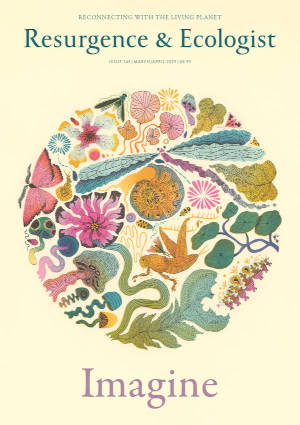Who speaks for the forests, rivers, and countless species on the verge of extinction? As humanity pushes the Earth’s ecosystems to breaking point, a growing movement insists that nonhuman Nature should no longer be voiceless in the political arena. Frustrated by slow progress and limited political will to curb the ecological crisis, activists and scholars are asking a radical question: what if Nature itself had a seat at the table?
What started as a thought experiment in scientific publications a few decades ago has now emerged into a global movement advocating for the political representation of Nature. The motivation is clear: a call for justice for non-human beings, and the pursuit of a healthy planet.
Initiatives like The Planetary Democrats argue that crises such as biodiversity loss, climate change and pollution are all symptoms of a deeper problem of governance. Humanity’s vast power to transform the planet has far outpaced its commitment to wielding that power wisely. Rather than addressing pressing issues like inequality or universal health care, global governance continues to prioritise policies that sustain a global network of extraction and consumption, often at the expense of long-term planetary wellbeing.
Including non-human beings in political demonstrations is seen as a way to counterbalance this anthropocentric governance, as decision makers would no longer be beholden solely to human constituents, but to all beings affected by their decisions. And whilst most people still hope for technological innovations to resolve these issues, this political approach to solving ecological problems is a tough sell. It’s a challenge like no other: persuading the group that is holding the monopoly on political power to share it. (The suffragettes knew how exhausting such an endeavour can be!)
In a quest to inspire deeper care for non-human beings, many initiatives are adopting diverse strategies. The Planet Politics Institute and Animals in Democracy, for example, raise awareness through public events and publications, while Animals in the Room is establishing a research centre in New York City to conduct studies on including animals in policy formulation. By bringing Nature’s interests into mainstream conversations, these organisations aim to ‘normalise’ the idea of non-human representation and elevate it as a legitimate issue in both academic and public discourse.
Meanwhile, projects such as Organisms Democracy and the Embassy of the North Sea create immersive experiences, inviting people to engage with Nature directly through interactive art and role play. These encounters encourage participants to step into the perspectives of non-human entities, from microorganisms to ecosystems, helping them view the world through new, and sometimes surprising lenses.
A rather unconventional approach that exploits a glitch in the human psyche is offered by the philosopher Jane Bennett. Her concept of strategic anthropomorphism involves attributing human qualities to non-human beings. The project Planetary Personhood is lending planet Mars a face – not to literally humanise the planet, but to foster empathy and respect for its distinct ways of being and to encourage recognition of its agency, capacity and vitality.
Promising pathways
But what would the integration of natural beings in political decision-making look like?
While the search for the best solution remains an ongoing debate, several institutional mechanisms offer promising pathways. Electoral reforms – such as proportional representation and lowered thresholds – could help bring more Green parties into parliaments, which would then provide better indirect representation for Nature’s interests. Deliberative initiatives such as citizen assemblies or deliberative and innovative mini-publics* can foster inclusive debates on ecological issues. Dedicated ombudspersons can inform legislators and advocate for the rights of natural entities. Assigning specific parliamentary seats to Nature’s representatives would provide natural beings with direct legislative power. And finally, new supranational institutions like an Earth System Council at UN level or a Planetary Parliament could address environmental challenges on a global scale.
All of these institutional mechanisms face three major challenges that we are already familiar with in our current political systems: how can representatives reveal the preferences of their constituents, how can the misuse of power be prevented, and how can conflicting interests be dealt with?
While current politicians can speak to their voters and draw on opinion polling, Nature’s representatives would have to observe and conduct research on the needs and requirements of the entities they represent. The Earth Species Project, ElephantVoices and Project CETI are already taking this a step further, aiming to speak with animals using AI technology.
A somewhat trickier problem is that natural beings cannot vote for themselves, which makes the election or appointment of the right personnel very important in order to prevent misuse of power and to achieve a high degree of legitimisation of the representatives. Limiting the term of office to one legislative period and ruling out donations could reduce the risk of adverse actors gaining too much power.
Given the complex nature of ecosystems, it is possible that representatives might not always fully anticipate the implications of their decisions or identify potential conflicts of interest. In the event that a conflict arose, representatives would have to weigh up the relative importance of the different needs and seek the best compromise in the form of the political processes that we already know, with all their advantages and disadvantages.
While most scholars acknowledge that some form of proxy representation or guardianship through humans is inevitable, philosopher Jonathon Keats pursues another approach. Instead of fixing the pitfalls of representational democracy, he aims to cut out the intermediary altogether. In lieu of relying on politicians, the legislation in his proposal is written by programs and algorithms that translate signals of high or low stress levels within ecosystems into progressive or conservative legislation.
Returning from this futuristic vision to the present day, first real-world successes can be observed. A number of jurisdictions, including Germany, Spain, New York City and the European Union, have now taken the step of appointing animal welfare commissioners, and New Zealand has a Parliamentary Commissioner for the Environment tasked with the mission to improve the quality of the environment.
In Iceland, the campaign Snæfellsjökul fyrir forseta nominated a glacier for the 2024 presidential election, and last year The Planetary Democrats nominated the entire planet Earth for the 2024 European Parliament election. Both nominations were rejected over insufficient supporting signatures, which resulted in a legal dispute over the question of whether non-human beings were unconstitutionally excluded from the election because they couldn’t sign the official forms, due to their characteristics, abilities and languages.
The Planetary Democrats group is now raising funds for a professional social media campaign to raise awareness for non-human politics and to enter the ballot for the 2029 European Parliament election.
And so, as momentum grows to give Nature a voice, let’s remember that it’s been speaking all along. Now it’s on us to learn how to listen.
* Mini-publics are forums where a group of randomly selected citizens deliberate on a public issue and make policy recommendations. They are democratic and designed to better engage citizens in policymaking.








